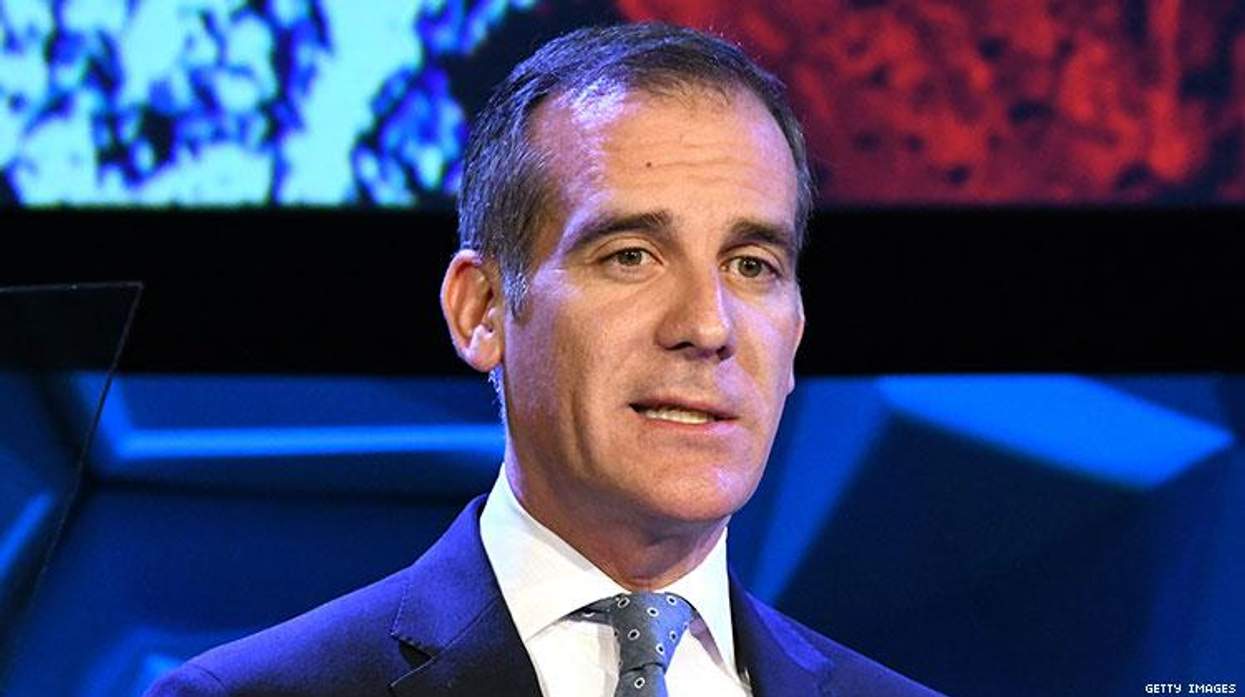As important as the Stonewall riots in New York City were in the modern LGBTQ rights movement, Los Angeles has played a significant role as well, Mayor Eric Garcetti noted in kicking off the city's Pride celebration.
The mayor hosted scores of L.A.-area Pride celebrants at a garden party at the Wattles Mansion in the Hollywood hills Wednesday night, and he spoke with The Advocate for a few minutes before addressing the crowd.
"Los Angeles doesn't follow, we lead," he told The Advocate. "I think many people think civil rights history is written in other parts of the country -- the South for racial equity, New York for LGBTQ equality. Los Angeles can lay claim to being at the forefront of desegregated schools, of pushing forward [for LGBTQ rights] long before Stonewall happened, with the Black Cat, and Cooper's Donuts a decade before."
The Black Cat protests against police raids at the gay bar of the same name took place in 1967 (also leading to the founding of The Advocate), and the Cooper's Donuts riots, likewise a reaction to police harassment, happened in 1959. And Los Angeles was home to another history-making LGBTQ event, the first Pride march west of the Mississippi, Garcetti pointed out; that was in 1970. L.A. isn't resting on its laurels, he added -- it's continuing to make progress, for instance, becoming the first major U.S. city with a transgender advisory council.
However, the city definitely has problems, one of them being homelessness, with the number of homeless people in Los Angeles hitting 36,000. It's a crisis that has resulted in some sharp criticism of Garcetti, and also a problem that disproportionately affects young people, especially LGBTQ youth. But the mayor reiterated his commitment to addressing homelessness, noting among other things that the city helped fund the Los Angeles LGBT Center's recently opened Anita May Rosenstein Campus, which has 100 beds for homeless youth and will soon add affordable apartments for seniors and supportive housing for young people.
For about a year and a half, he added, the city has been sponsoring monthly "strolls" of advocates and service providers along Santa Monica Boulevard, where many homeless youth gather, in order to connect these young people with help. "We don't wait for people to come to us," he said. There is also a city shelter at the YWCA for homeless women, and it includes beds for trans women, he pointed out.
With its LGBTQ-inclusive policies, Los Angeles can be a beacon to the rest of the nation, he said, putting its public safety in the hands of a police force that includes many LGBTQ officers at a time when the president considers trans people not fit to serve in the military, and continuing to make the fight against HIV and AIDS a priority when the president has fired his advisory council on this issue.
"We hope the rest of the country sees the sky doesn't fall when you do these things" to advance LGBTQ equality, he said. Instead, "it gets a little bit brighter."
Garcetti made many of the same points when addressing partygoers in the mansion's garden from a second-floor balcony, something he dubbed his "Evita moment" -- he even sang a few notes of "Don't Cry for Me, Argentina." More seriously, he ran down some of the Trump administration's attacks on the LGBTQ community, then said, "We, Los Angeles, are fighting back."
"This is one of the great civil rights cities in the world," he added, saying this weekend's Pride events are about not only celebration but fighting to advance the cause. "Not until we all have full rights, not until we have a federal government that matches what we do here locally, will we rest, and even then we know there will be work to do internationally."
He was joined by Estevan Montemayor, board president for Christopher Street West, the organization that runs LA Pride. The weekend-long festival and Sunday's parade now actually happen in West Hollywood, the heavily LGBTQ independent city adjacent to Los Angeles, but L.A. is heavily involved in the effort. Of Los Angeles, West Hollywood, and the rest of Southern California, Garcetti said, "We are the beacon, we are the light, we are the future, and we will not stop until we have equality for everyone."
There have often been signs that Garcetti is interested in higher office, although this year he decided against making a presidential bid. Asked by The Advocate about his post-mayoral plans, he said, "I've got three and a half juicy years left, so I don't plan too far in the future." When his tenure's up, he added, he'll see what possibilities present themselves, in public office or otherwise.




































































Charlie Kirk DID say stoning gay people was the 'perfect law' — and these other heinous quotes